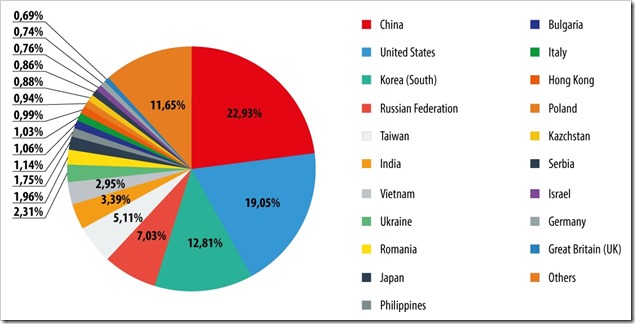India Accounts For 3.4% of Spam, 6th Highest In The World
According to Kaspersky Lab report on Spam monitoring, India is one of the top 10 nations in the world in distributing worldwide spam. Almost 3.4% of spam is generated in India and while it seems small in percentage, considering that we are a nation still in the beginning of the internet revolution, it is very dangerous from a security point of view. [Via]
Very few people in India are actively aware about internet security and while spam filters in gmail, outlook etc. are very crucial, even they cannot stop all the spam.

According to Altaf Halde, Managing Director, Kaspersky Lab – South Asia, “Spammers are becoming more intelligent in masking their messages. Internet users in India should start taking their digital security seriously, with the number of threat vectors increasing alarmingly along with the rise of cybercriminal activities. With regards to spam, the government should initiate spam laws that will deter spammers from making India their safe havens.”
South Korea was number one is sending the spams to European countries (48.6%), while China (23%) was top overall.
The major source of spam seems to be fake notifications from popular social websites like Facebook, asking you to open archive attached. The spam in February was majorly Trojan-dominated. The Trojan installed two programs in the system of the user-
- A spyware that steals the documents (*.docx, *.pdf, *.xlsx) and send to specific email address.
- Another is IRC-bot/worm called ShitStorm which can carry out DDoS attacks on websites and spread copies of itself via MSN and P2P services.
Responding to such mail can make the user part of the botnet.
Also, there were ransomware which would block the user’s computer and ask for money to unblock it. ( Recently, there was a death reported due to ransomware)
With data becoming more prominent and more online, the amount of spam is bound to increase every day. It has become imperative that individuals take care of their online activity lest they want their credit card information or login information in malicious hands.
In the end, I would leave you with the famous ‘Nigerian’ scammers who could not leave the situation of Ukraine alone. Citing some familiar stories about unfortunate tourists in Kiev who had all their money stolen, they requested for financial assistance.
